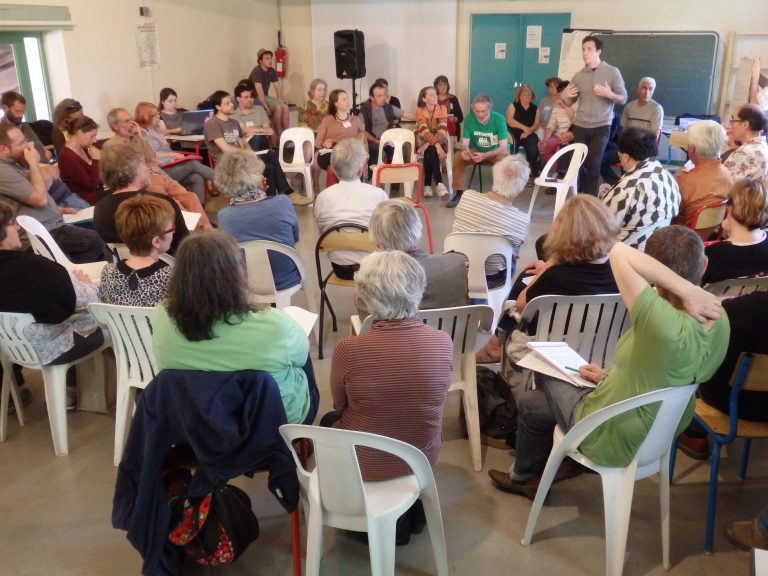The French Community Supported Agriculture movement (AMAP) facing domestic challenges, hopes for European support
By Jocelyn Parot, General Secretary of Urgenci
Urgenci, the European CSA movement, and how to connect the different levels of action for Food Sovereignty ranked high among the hot topics discussed at the 5th National AMAP Meeting in Castres, Southern France, on the 4th – 5th of June.

The AMAP promise: overcome the producer-consumer divide and form a new alliance
The French AMAP movement is 15 years old, and accounts for over 2,000 groups and 250,000 consumers nation-wide. Even with such a long background, the debates between “Amapians” are almost as passionate as they were when the first AMAP groups were founded in May 2001 in the Provence Region.
The word AMAP, which stands for Association pour le maintien d’une agriculture paysanne, and could be roughly translated into Association for maintaining small-scale family farming symbolises many promises. These include a fair income for producers, more environmentally friendly production practices, and the promise of a new alliance between producers and consumers. “The core message of the AMAP model is to redefine the producer-consumer relationship and invent a new kind of alliance”, says Leo Coutellec, the outgoing Miramap board spokesman. “To some extent, our movement even blurs the division between farmers and eaters. In our groups, there is sometimes a feeling of being a “co-producer”. In this sense, there is clearly a revolutionary aspect to our action”.

The limits of AMAPs: the difficulty of mobilising around the core message on Food Sovereignty
Several of the 80 participants expressed their concern that it is difficult to be aware of this message, even within the movement. Olivier Lavielle, from the Paris area network, shares his own feeling, based on a significant experience as an AMAP group leader: “it is actually difficult to mobilise on a large basis within our groups for something beyond the weekly share. I think a lot of work needs to be done to give more visibility to the social dimension of what we are doing and to connect with the larger picture”. Olivier says communication campaigns will help make these dimensions more obvious to every AMAP member.
There is an urgent need for this kind of recognition: the financial autonomy of many regional AMAP networks has been undermined since several local authorities announced a drastic reduction of their support. “These budget cuts are dictated by the political swing in the Regional elections last winter”, says Aziyadé Baïnouti from the Provence-Alpes-Cote-d’Azur Region. “It will be difficult to find a new balance in such a time of crisis”. Jerome Dehondt, a farmer from Western France, sees this turning point as an opportunity for the AMAP networks to redefine their missions: dissemination, support to groups and farmers, tool sharing, mutualisation, popular education on the AMAP principles, communication. They believe the movement has the maturity required for a genuine renewal process.

The European movement as a source of inspiration and innovation
The solidarity with other CSA movements around Europe was extensively discussed within the 3 well-attended workshops organized about the European CSA Declaration writing process. A French draft of the Declaration was shared. The process, in which some Miramap representatives have been participating was greeted with great enthusiasm and sparked a lot of discussion. It is also worth mentioning that Miramap has just conducted the AMAP charter revision process that lasted for 2 years. It gave over 10,000 Amapians the possibility of contributing, and ended with the formal adoption of the new charter in December 2014. This experience inspired the European CSA Declaration writing process.
It is however possible that the situation could change deeply in the coming months, as the AMAP movement is facing new challenges and will increasingly turn to other parts of Europe for support. Exchanges with European fellow CSA practitioners will certainly open up new perspectives on, models and common projects.
A new chapter of the European CSA Movement will be written in Ostrava, 16-18 September 2016, and it will allow Amapians to broaden their perspective on CSA and also enable Europeans to learn from the solid experience of the French AMAPs. Ostrava will also be the prelude to the second Nyéléni Europe Food Sovereignty movement gathering in Cluj, Napoca in Romania at the end of October.
Information about the 3rd European Meeting of CSA Movements: http://ostrava.urgenci.net
Register for Ostrava (deadline: 30 June): https://survey.owlswatch.net/index.php/763984
Miramap website: miramap.org

